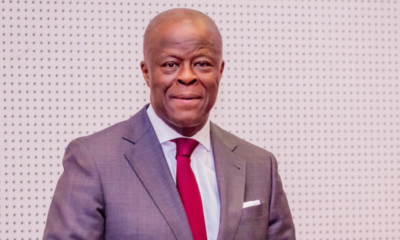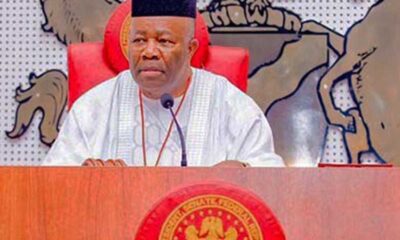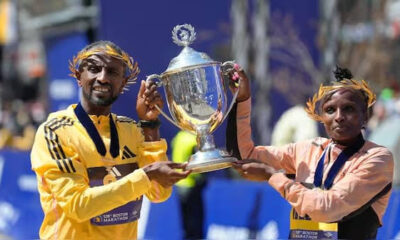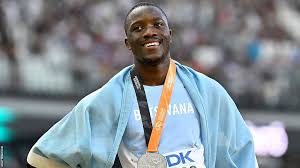Strictly Personal
Multiple murders so cruel and this evil world, By Festus Adedayo
Published
1 year agoon

The Fatinoyes were killed in their home located in Ibara Government Reservation Area, Abeokuta, Ogun State, a few hours after the break of the new year. According to newspaper reports, the duo, who worked at the Central Bank of Nigeria (CBN) and the Federal University of Agriculture, Abeokuta respectively, had just returned from the yearly church ritual of Crossover Service when their assailants struck. Not only did the killers snuff life out of them, but their corpses were also set ablaze, ostensibly to shroud the motive of and railroad investigators from the alibi for the assassination. As they escaped the scene, the killers dragged with them the Fatinoyes’ 23-year-old son, Oreoluwa, who they abducted. Three days after, the lifeless body of Oreoluwa was found floating in a river along the Adigbe-Obada Road, Abeokuta, his hands tied behind him. Very few murders of that cruel brew have made my heart this shattered, while I remain inconsolable and distraught. It was as if I knew this hapless couple while they were alive.
What juts out for all to see in this heartless murder is a literal wiping off of the Fatinoye generation. It is united by the grisly undercoating of the assassination. On its surface, this killing is callous and reeks of inexplicable wickedness that lies at the heart of man.
Globally and almost on a daily basis, heart-wrenching wickedness and evils of frightening proportions and dimensions are unleashed into the public space. Only on Christmas day, Nigerians were aghast to hear of the killing of a Lagos-based lawyer, Bolanle Raheem, gunned down by ASP Drambi Vandi at Ajah in Lagos State.
To be sure, our world is bespattered with evils and wickedness of unimaginable proportions. On December 14, 2012, for instance, a 20-year-old boy, Adam Lanz, at the Sandy Hook Elementary School in the village of Sandy Hook in Newtown, Connecticut, fatally gunned down 20 kids and six other grown-up staff members of the school. It was a mass murder that was considered to rank, as at then, as the second deadliest mass shooting perpetrated by one person in American history. History also recorded it as an American school’s second deadliest mass murder. Adam had gunned down his victims multiple times, shooting many of them at close quarters. You would think you were reading any of the famous crime thriller novels of James Hadley Chase.
What has been considered even the most intriguing and a major issue for consideration for criminologists and psychologists is that Adam was very calm, cool and devoid of emotions as he inflicted mayhem on his victims. If your immediate conclusion was that Adam was suffering the pangs of drug usage, you were wrong. Investigations later revealed that he had none in his system nor even a residue of alcohol or any mind-wrenching substance. Adam shot with his sobriety intact and as philosopher, John Phillip Togado, said, “he was in his right mind doing the most wrong thing… was in his sanest state doing the most insane thing.”
It will thus be wonky analysis to submit that, in the world today, there is a recent implosion of evil and wickedness; or that modernity has made the global atrocity paradigm shoot up. Far be it from the truth. From the creation of the world, even by the account of the holy writ and its narratives of immediate post-creation, man’s wickedness has been of heartrending stature. Like a serpent, man hatches and curates evil every single day. The seeming implosion of the narratives of evils and wickedness only get amplified by the multifarious media outlets available to man in this modern age. Parodying the holy writ, one can say that the heart of man has been desperately wicked, from his creation.
Listening to a track of late Ibadan Awurebe music maestro, Dauda Epo Akara, recently, I was reminded of how criminals concoct alibis for their psychopathic actions. I also got an idea of how musicians and society as a whole covertly lend a hand in the commitment of crimes. Done in the early 1970s, the song, while praise-singing the Oredegbe Society in Mushin, Lagos, Epo Akara sang the panegyrics of members of that Society who he said emerged from refined pedigrees. Omo eyan’re – he said of them. One of these was Lagos socialite and notorious land grabber, Jimoh Ishola, also known as Ejigbadero.
Ishola had arranged a child naming ceremony, attended by the crème-de-la crème of society, to coincide with his murder of Jimoh Oba who he hoped to dispossess of a land. For an alibi, he pasted Naira notes on the face of the invited musician for the ceremony, changed his clothes and drove, through the backdoor of his house, to go kill Oba in the farm, returned to the ceremony and continued with the event. Ejigbadero had virtually all musicians singing his praises. No one was able to bell the cat of where his obnoxious wealth emanated from, including a famous musician who sang that as inscrutable as it is to know how liquid enters a coconut pod, so was the mystery of Ejigbadero’s wealth. By the way, till today, one of my major regrets is that, in one of my off-handed discussions with Late Oba Lamidi Adeyemi, the famous king had told me that the Nigerian state and the military rulers of the time connived in Ejigbadero’s eventual conviction by the court and his subsequent execution in 1979, four years after his murder of Oba. I blame myself on why I suddenly lost my inquisitiveness and didn’t interrogate Alaafin of Oyo further on that submission. Now, the Alaafin, an iconoclast, a walking encyclopedia of ancient and contemporary history, has gone with what may be a valid information in that regard.
The cases of Adam, the murder of the Fatinoyes, point blank shooting of Lagos lawyer on Christmas day by ASP Drambi Vandi and so many others which occurred and are still occurring in the world, have provoked so many unanswered or unanswerable questions. They range from, as posed by Togado, “why do evil people find painful choices neither difficult nor painful?… Must (we) become evil to fight evil?” So, I ask, why do atrocities, evils of frightening dimensions, wickedness in high and low places, outweigh good in this world? Are human beings naturally evil?
Already, due to the multiple evils associated with the Nigerian policemen, the general impression is that the Nigeria Police Force is the natural domicile of the Nigerian Devil, in its imperial and unpretentious wickedness. I shuddered at a Twitter post I stumbled upon last week which seems to sum up the general impression of Nigerians about the Force. The post read, “If I see a policeman dying by the roadside and needing help, God in heaven knows I will not help. I will jump and pass. I hate you guys. All of you, Nigerian policemen. My experience with you guys has (sic) left me very bitter. Even you, Mr. Ben, I hate you. You guys irritate me.” Even Benjamin Hudenyin, Lagos Police PRO, was seemingly speechless as he tried to spin the good deeds he attributed to the Nigerian police. You can imagine the ounce of wickedness from the police the fellow who wrote this must have encountered.
Philosophers say that evil is actually the parent of actions that are considered by humanity as wicked. Wicked actions are ones considered to be at the same gruesome level with that of animals or beasts. Stanley Benn, a research fellow in Philosophy at the Australian National University, Canberra, said wickedness is one of the extracts of evil.
In distinguishing different varieties of wickedness, Benn dimensioned them into self-centered wickedness, psychopathic wickedness and conscientious wickedness. According to him, self-centered wickedness can be likened to narcissism where the sufferer from this selfish wickedness defines what is good according to what is good for them. The second, psychopathic wickedness or what he labeled “moral imbecility,” happens when the sufferer does not factor the wellbeing of others into their action. The last, conscientious wickedness occurs when its perpetrator sees their action as reasonable and necessary.
You may like
-


IMF predicts Nigeria’s inflation to drop to 18% by 2026
-


Air Peace, capitalism and national interest, By Dakuku Peterside
-


Nigeria’s finance ministry unveils system to monitor tax exemptions
-


Nigeria: Senate President wants police rid of bad officers
-


Nigeria’s inflation hits 28-year high of 33.20%
-


Diesel gulping over 80% of Nigerian manufacturers’ profit, association claims
Strictly Personal
Air Peace, capitalism and national interest, By Dakuku Peterside
Published
1 day agoon
April 16, 2024
Nigerian corporate influence and that of the West continue to collide. The rationale is straightforward: whereas corporate activity in Europe and America is part of their larger local and foreign policy engagement, privately owned enterprises in Nigeria or commercial interests are not part of Nigeria’s foreign policy ecosystem, neither is there a strong culture of government support for privately owned enterprises’ expansion locally and internationally.
The relationship between Nigerian businesses and foreign policy is important to the national interest. When backing domestic Nigerian companies to compete on a worldwide scale, the government should see it as a lever to drive foreign policy, and national strategic interest, promote trade, enhance national security considerations, and minimize distortion in the domestic market as the foreign airlines were doing, boost GDP, create employment opportunities, and optimize corporate returns for the firms.
Admitted nations do not always interfere directly in their companies’ business and commercial dealings, and there are always exceptions. I can cite two areas of exception: military sales by companies because of their strategic implications and are, therefore, part of foreign and diplomatic policy and processes. The second is where the products or routes of a company have implications for foreign policy. Air Peace falls into the second category in the Lagos – London route.
Two events demonstrate an emerging trend that, if not checked, will disincentivize Nigerian firms from competing in the global marketplace. There are other notable examples, but I am using these two examples because they are very recent and ongoing, and they are typological representations of the need for Nigerian government backing and support for local companies that are playing in a very competitive international market dominated by big foreign companies whose governments are using all forms of foreign policies and diplomacy to support and sustain.
The first is Air Peace. It is the only Nigerian-owned aviation company playing globally and checkmating the dominance of foreign airlines. The most recent advance is the commencement of flights on the Lagos – London route. In Nigeria, foreign airlines are well-established and accustomed to a lack of rivalry, yet a free-market economy depends on the existence of competition. Nigeria has significantly larger airline profits per passenger than other comparable African nations. Insufficient competition has resulted in high ticket costs and poor service quality. It is precisely this jinx that Air Peace is attempting to break.
On March 30, 2024, Air Peace reciprocated the lopsided Bilateral Air Service Agreement, BASA, between Nigeria and the United Kingdom when the local airline began direct flight operations from Lagos to Gatwick Airport in London. This elicited several reactions from foreign airlines backed by their various sovereigns because of their strategic interest. A critical response is the commencement of a price war. Before the Air Peace entry, the price of international flight tickets on the Lagos-London route had soared to as much as N3.5 million for the economy ticket. However, after Air Peace introduced a return economy class ticket priced at N1.2 million, foreign carriers like British Airways, Virgin Atlantic, and Qatar Airways reduced their fares significantly to remain competitive.
In a price war, there is little the government can do. In an open-market competitive situation such as this, our government must not act in a manner that suggests it is antagonistic to foreign players and competitors. There must be an appearance of a level playing field. However, government owes Air Peace protection against foreign competitors backed by their home governments. This is in the overall interest of the Nigerian consumer of goods and services. Competition history in the airspace works where the Consumer Protection Authority in the host country is active. This is almost absent in Nigeria and it is a reason why foreign airlines have been arbitrary in pricing their tickets. Nigerian consumers are often at the mercy of these foreign firms who lack any vista of patriotism and are more inclined to protect the national interest of their governments and countries.
It would not be too much to expect Nigerian companies playing globally to benefit from the protection of the Nigerian government to limit influence peddling by foreign-owned companies. The success of Air Peace should enable a more competitive and sustainable market, allowing domestic players to grow their network and propel Nigeria to the forefront of international aviation.
The second is Proforce, a Nigerian-owned military hardware manufacturing firm active in Rwanda, Chad, Mali, Ghana, Niger, Burkina Faso, and South Sudan. Despite the growing capacity of Proforce in military hardware manufacturing, Nigeria entered two lopsided arrangements with two UAE firms to supply military equipment worth billions of dollars , respectively. Both deals are backed by the UAE government but executed by UAE firms.
These deals on a more extensive web are not unconnected with UAE’s national strategic interest. In pursuit of its strategic national interest, India is pushing Indian firms to supply military equipment to Nigeria. The Nigerian defence equipment market has seen weaker indigenous competitors driven out due to the combination of local manufacturers’ lack of competitive capacity and government patronage of Asian, European, and US firms in the defence equipment manufacturing sector. This is a misnomer and needs to be corrected.
Not only should our government be the primary customer of this firm if its products meet international standards, but it should also support and protect it from the harsh competitive realities of a challenging but strategic market directly linked to our national military procurement ecosystem. The ability to produce military hardware locally is significant to our defence strategy.
This firm and similar companies playing in this strategic defence area must be considered strategic and have a considerable place in Nigeria’s foreign policy calculations. Protecting Nigeria’s interests is the primary reason for our engagement in global diplomacy. The government must deliberately balance national interest with capacity and competence in military hardware purchases. It will not be too much to ask these foreign firms to partner with local companies so we can embed the technology transfer advantages.
Our government must create an environment that enables our local companies to compete globally and ply their trades in various countries. It should be part of the government’s overall economic, strategic growth agenda to identify areas or sectors in which Nigerian companies have a competitive advantage, especially in the sub-region and across Africa and support the companies in these sectors to advance and grow to dominate in the African region with a view to competing globally. Government support in the form of incentives such as competitive grants ,tax credit for consumers ,low-interest capital, patronage, G2G business, operational support, and diplomatic lobbying, amongst others, will alter the competitive landscape. Governments and key government agencies in the west retain the services of lobbying firms in pursuit of its strategic interest.
Nigerian firms’ competitiveness on a global scale can only be enhanced by the support of the Nigerian government. Foreign policy interests should be a key driver of Nigerian trade agreements. How does the Nigerian government support private companies to grow and compete globally? Is it intentionally mapping out growth areas and creating opportunities for Nigerian firms to maximize their potential? Is the government at the domestic level removing bottlenecks and impediments to private company growth, allowing a level playing field for these companies to compete with international companies?
Why is the government patronising foreign firms against local firms if their products are of similar value? Why are Nigerian consumers left to the hands of international companies in some sectors without the government actively supporting the growth of local firms to compete in those sectors? These questions merit honest answers. Nigerian national interest must be the driving factor for our foreign policies, which must cover the private sector, just as is the case with most developed countries. The new global capitalism is not a product of accident or chance; the government has choreographed and shaped it by using foreign policies to support and protect local firms competing globally. Nigeria must learn to do the same to build a strong economy with more jobs.
Strictly Personal
This is chaos, not governance, and we must stop it, By Tee Ngugi
Published
1 week agoon
April 10, 2024
The following are stories that have dominated mainstream media in recent times. Fake fertiliser and attempts by powerful politicians to kill the story. A nation of bribes, government ministries and corporations where the vice is so routine that it has the semblance of policy. Irregular spending of billions in Nairobi County.
Billions are spent in all countries on domestic and foreign travel. Grabbing of land belonging to state corporations, was a scam reminiscent of the Kanu era when even public toilets would be grabbed. Crisis in the health and education sectors.
Tribalism in hiring for state jobs. Return of construction in riparian lands and natural waterways. Relocation of major businesses because of high cost of power and heavy taxation. A tax regime that is so punitive, it squeezes life out of small businesses. Etc, ad nauseam.
To be fair, these stories of thievery, mismanagement, negligence, incompetence and greed have been present in all administrations since independence.
However, instead of the cynically-named “mama mboga” government reversing this gradual slide towards state failure, it is fuelling it.
Alternately, it’s campaigning for 2027 or gallivanting all over the world, evoking the legend of Emperor Nero playing the violin as Rome burned.
A government is run based on strict adherence to policies and laws. It appoints the most competent personnel, irrespective of tribe, to run efficient departments which have clear-cut goals.
It aligns education to its national vision. Its strategies to achieve food security should be driven by the best brains and guided by innovative policies. It enacts policies that attract investment and incentivize building of businesses. It treats any kind of thievery or negligence as sabotage.
Government is not a political party. Government officials should have nothing to do with political party matters. They should be so engaged in their government duties that they literally would not have time for party issues. Government jobs should not be used to reward girlfriends and cronies.
Government is exhausting work undertaken because of a passion to transform lives, not for the trappings of power. Government is not endless campaigning to win the next election. To his credit, Mwai Kibaki left party matters alone until he had to run for re-election.
We have corrupted the meaning of government. We have parliamentarians beholden to their tribes, not to ideas.
We have incompetent and corrupt judges. We have a civil service where you bribe to be served. Police take bribes to allow death traps on our roads. We have urban planners who plan nothing except how to line their pockets. We have regulatory agencies that regulate nothing, including the intake of their fat stomachs.
We have advisers who advise on which tenders should go to whom. There is no central organising ethos at the heart of government. There is no sense of national purpose. We have flurries of national activities, policies, legislation, appointments which don’t lead to meaningful growth. We just run on the same spot.
Tee Ngugi is a Nairobi-based political commentator
EDITOR’S PICK


African Guarantee Fund partners Nordic Development Fund to launch green finance in Nigeria
The African Guarantee Fund (AGF) has teamed up with the Nordic Development Fund (NDF) to launch a green finance fund...


Ethiopia’s Lemma, Kenya’s Obiri give Africa double podium finish at Boston Marathon
Ethiopia’s long distance runner, Sisay Lemma, and Kenyan female marathon sensation, Hellen Obiri, teamed up to give Africa a double...


Davido’s ‘Unavailable’ achieves milestone with 100 million views on YouTube, Spotify
Nigeria’s Afrobeats sensation, David Adeleke, popularly known as Davido, has landed another milestone after his hit single, “Unavailable’, surpassed 100...


Zambia: Many feared injured as UPND, PF supporters clash in court
An unspecified number of people have been reported injured following a clash between supporters of Zambia’s ruling party, the United...


Investors’ wealth drops by $968 million on Nairobi Securities Exchange
In the last two weeks, investors at the Nairobi Securities Exchange (NSE) have taken profits, which has reduced investor wealth...


IMF predicts Nigeria’s inflation to drop to 18% by 2026
The International Monetary Fund (IMF) has predicted that inflation rate in Nigeria will drop to 23 per cent in 2025...


Air Peace, capitalism and national interest, By Dakuku Peterside
Nigerian corporate influence and that of the West continue to collide. The rationale is straightforward: whereas corporate activity in Europe...


Cameroon opens museum dedicated to oldest, influential kingdoms
The Cameroonian government has inaugurated a historical museum which is dedicated to honouring its oldest and most influential kingdoms. Known...


South Africa’s crypto firm VALR gets licence to operate as asset service provider
South African leading cryptocurrency exchange trading firm, VALR, has been granted both Category I and Category II licence by the...


Botswana sprint star Letsile Tebogo speaks of ambition to match Usain Bolt as world’s greatest
Botswana sprint star, Letsile Tebogo, has talked of his ambition to match his idol, Usain Bolt, with the upcoming Paris...
Trending
-

 Politics2 days ago
Politics2 days agoNigeria: Senate President wants police rid of bad officers
-

 Sports1 day ago
Sports1 day agoBotswana sprint star Letsile Tebogo speaks of ambition to match Usain Bolt as world’s greatest
-

 Sports13 hours ago
Sports13 hours agoEthiopia’s Lemma, Kenya’s Obiri give Africa double podium finish at Boston Marathon
-

 Tech1 day ago
Tech1 day agoSouth Africa’s crypto firm VALR gets licence to operate as asset service provider


